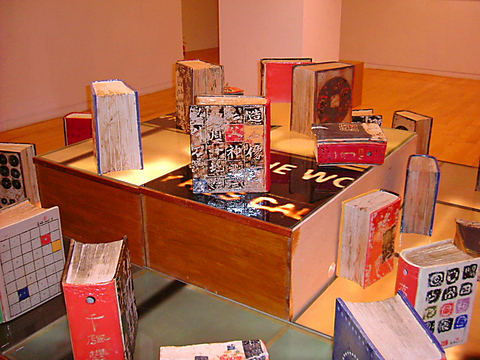In fine arts, discussion of East meets West often arises when the subject turns to contemporary Chinese ink brush painting. One of the foremost authorities on this subject, Liu Kuo-sung (劉國松), is participating in a group exhibition currently on view at the Hong-gah Museum.
Titled Treasured Objects of the Literati , it also features the work of Yuan Chin-taa (
The challenge for today's ink brush artist is to master the traditional technique while keeping the content relevant to today's world. Otherwise, it looks like merely imitating past achievements without offering anything new.

PHOTO: SUSAN KENDZULAK, TAIPEI TIMES
A brief historical note to set this exhibition into context: After the Yuan dynasty (1279 AD to 1368 AD), the literati took on ink painting as a hobby, so that paintings were more written (calligraphic) than painted.
For Taiwanese painters of the 20th century, who felt caught between western modernism with its emphasis on freedom of expression, and the history of Chinese calligraphic painting, there seemed to be a difficulty in choosing which direction to follow.
The Hong-gah exhibition features the above three Taiwanese ink brush painters' most recent works and a ceramics installation by Liu.
Born in China in 1932, Liu led the "Modern Chinese Painting Movement" in the 1950s and he is known for his innovative techniques such as non-brush-and-ink painting.
Yuan Chin-taa (
Like Yuan, many Taiwanese artists make strong political statements in a subtle way. At first glance, the painting looks simply like a painting of many chairs arranged in rows. However, these innocuous objects are imbued with political meaning.
Hung Ken-shan (
The Nanhai Gallery is part of what was the Taipei Teacher's College and which recently changed to the National Taipei University of Education. It's a great little place that captures the energy of a university coffee house where a wide range of cultural activities take place.
The second floor has a small cafe offering soft drinks and beer. Sometimes on weekend nights, musicians gather to play live music, while on weekend afternoons there may be in-depth panel discussions led by arts professors with their young art students.
Ivy Huey (
Exhibition notes:
What: "Treasured Objects of the Literati"
Where: Hong-gah Museum, 5F, 260, Dayeh Road, Qiyen MRT stop, Taipei
Tel: (02) 2894 2272
When: To Oct. 30
What: "The Dress Magician"
Where: Nanhai Gallery, 3, Ln 19, Chongqing S Rd, Sec 2, Taipei
TEL: (02) 2392 5080 When: To Nov. 6

Oct. 27 to Nov. 2 Over a breakfast of soymilk and fried dough costing less than NT$400, seven officials and engineers agreed on a NT$400 million plan — unaware that it would mark the beginning of Taiwan’s semiconductor empire. It was a cold February morning in 1974. Gathered at the unassuming shop were Economics minister Sun Yun-hsuan (孫運璿), director-general of Transportation and Communications Kao Yu-shu (高玉樹), Industrial Technology Research Institute (ITRI) president Wang Chao-chen (王兆振), Telecommunications Laboratories director Kang Pao-huang (康寶煌), Executive Yuan secretary-general Fei Hua (費驊), director-general of Telecommunications Fang Hsien-chi (方賢齊) and Radio Corporation of America (RCA) Laboratories director Pan
The consensus on the Chinese Nationalist Party (KMT) chair race is that Cheng Li-wun (鄭麗文) ran a populist, ideological back-to-basics campaign and soundly defeated former Taipei mayor Hau Lung-bin (郝龍斌), the candidate backed by the big institutional players. Cheng tapped into a wave of popular enthusiasm within the KMT, while the institutional players’ get-out-the-vote abilities fell flat, suggesting their power has weakened significantly. Yet, a closer look at the race paints a more complicated picture, raising questions about some analysts’ conclusions, including my own. TURNOUT Here is a surprising statistic: Turnout was 130,678, or 39.46 percent of the 331,145 eligible party

The classic warmth of a good old-fashioned izakaya beckons you in, all cozy nooks and dark wood finishes, as tables order a third round and waiters sling tapas-sized bites and assorted — sometimes unidentifiable — skewered meats. But there’s a romantic hush about this Ximending (西門町) hotspot, with cocktails savored, plating elegant and never rushed and daters and diners lit by candlelight and chandelier. Each chair is mismatched and the assorted tables appear to be the fanciest picks from a nearby flea market. A naked sewing mannequin stands in a dimly lit corner, adorned with antique mirrors and draped foliage

The election of Cheng Li-wun (鄭麗文) as chair of the Chinese Nationalist Party (KMT) marked a triumphant return of pride in the “Chinese” in the party name. Cheng wants Taiwanese to be proud to call themselves Chinese again. The unambiguous winner was a return to the KMT ideology that formed in the early 2000s under then chairman Lien Chan (連戰) and president Ma Ying-jeou (馬英九) put into practice as far as he could, until ultimately thwarted by hundreds of thousands of protestors thronging the streets in what became known as the Sunflower movement in 2014. Cheng is an unambiguous Chinese ethnonationalist,